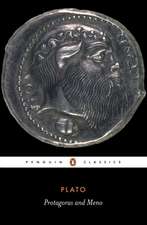The Greek Sophists
Editat de John Dillonen Limba Engleză Paperback – 30 iul 2003
For more than seventy years, Penguin has been the leading publisher of classic literature in the English-speaking world. With more than 1,700 titles, Penguin Classics represents a global bookshelf of the best works throughout history and across genres and disciplines. Readers trust the series to provide authoritative texts enhanced by introductions and notes by distinguished scholars and contemporary authors, as well as up-to-date translations by award-winning translators.
Preț: 95.79 lei
Nou
Puncte Express: 144
Preț estimativ în valută:
18.33€ • 19.07$ • 15.13£
18.33€ • 19.07$ • 15.13£
Carte disponibilă
Livrare economică 24 martie-07 aprilie
Livrare express 07-13 martie pentru 25.48 lei
Preluare comenzi: 021 569.72.76
Specificații
ISBN-13: 9780140436891
ISBN-10: 0140436898
Pagini: 464
Dimensiuni: 129 x 198 x 26 mm
Greutate: 0.38 kg
Editura: Penguin Books
Colecția Penguin Classics
Locul publicării:London, United Kingdom
ISBN-10: 0140436898
Pagini: 464
Dimensiuni: 129 x 198 x 26 mm
Greutate: 0.38 kg
Editura: Penguin Books
Colecția Penguin Classics
Locul publicării:London, United Kingdom
Notă biografică
JOHN DILLON is now Regius Professor of Greek at Trinity College, Dublin.
TANIA GERGEL is a lecturer in Ancient Greek Philosophy in the Department of Classics at King's College, London.
TANIA GERGEL is a lecturer in Ancient Greek Philosophy in the Department of Classics at King's College, London.
Cuprins
The Greek SophistsChronology
Introduction
Further Reading
A Note on the Text
1. Protagoras of Abdera 2. Gorgias of Leontini 3. Prodicus of Ceos 4. Hippias of Elis 5. Antiphon 6. Thrasymachus of Chalcedon 7. Critias of Athens 8. Euthydemus and Dionysodorus of Chios 9. Alcidamas of Elaea 10. The Anonymus Iamblichi and the Double Arguments
Appendix: A Conspectus of Sources Notes Index of Rhetorical Terms Index
Descriere
By mid-5th century BC, Athens was governed by democratic rule and power turned upon the ability of the citizen to command the attention of the people, and to sway the crowds of the assembly. It was the Sophists who understood the art of rhetoric and the importance of transforming effective reasoning into persuasive public speaking.


























